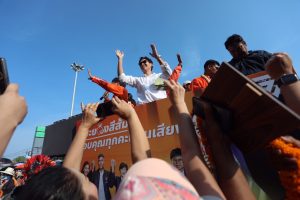Thailand’s general election on May 14 delivered a clear blow to the country’s military and ruling conservative establishment. However, the road ahead for the opposition led by the Move Forward Party (MFP) will be difficult. The rules for forming a government, enshrined in the constitution drafted after the 2014 coup, require that a winning coalition also needs the votes of 250 military-appointed senators. But whatever happens next, the election marks a turning point in Thai politics. Despite going relatively unnoticed in international headlines, the election results have been years in the making and are symptomatic of longer and deeper collaborations within Thai civil society. The rejection of military-dominance in Thai politics is unlikely to dim in the near future, regardless of whether the military-appointed senators cooperate.
Why a Majority Is Not Sufficient
Under the 2017 Constitution, forming a government in Thailand requires more than winning a majority in the general elections. It requires a combined majority of votes from both the democratically-elected House of Representatives (500 seats) and the military-appointed Senate (250 seats). Last week’s election saw the MFP and other opposition parties win a majority of seats in the House, and as of this writing, the MFP’s coalition will hold an impressive 313 seats in the House. However, for the MFP’s leader Pita Limjaroenrat to be approved as prime minister, he needs at least 376 votes from both the House and Senate. It is uncertain if the MFP and its allies can attain the additional 63 votes.
Despite being appointed by the military, the Senate is still a wildcard. Some have openly admitted that they would not necessarily vote to support the people’s will for change, but would make a judgement based on their own criteria, such as what they think is good for the nation, religion, and the monarchy. Others have indicated that they would vote in accordance with the election’s results. Others still have suggested that they would abstain from voting altogether, claiming that the prime minister should reflect the people; they, as senators, should refrain from exercising their power to vote. However, given that the Thai people have already clearly made their will known, to abstain from voting would in fact be to to deny the winning coalition the crucial votes it needs to form a government.
Civil Society Innovation
Regardless of how the Senate acts, the 2023 election is still a watershed moment for Thailand. It reflects the depth of the popular desire for change, especially for a move away from military-dominated politics. The ruling coalition of military parties together won just 77 seats, a significant reduction from the 116 seats they captured in the 2019 election. But this result did not come out of nowhere. It reflects years of mobilization by Thai civil society.
A crucial step in mobilizing people to vote is the belief that elections will be free and fair. This is especially important given the irregularities in the 2019 election, such as the plausibility of fraud that has yet to be explained by the military-appointed Election Commission or the ad hoc change of voting rules, including a cancellation of live election results.
In a system so influenced by the military establishment, civil society is essential for election monitoring. In the 2019 election, a group of media outlets, NGOs, and tech social enterprises collaborated to create Vote62, in order to promote greater transparency around the electoral process. The system crowdsources real-time ballot-counting information: citizens present at polling stations can share photos of vote tallies with enumerators online to provide an independent database for counter-checking the results announced by the Election Commission.
The Vote62 system took-off in the year prior to the 2023 election. Its official Facebook page reported that the website received almost 500,000 photos of countering results submitted by people nationwide. The main webpage reporting real-time votes has had 4.2 million views with 1.6 million viewers. They have caused Election Commission staff to recount votes in cases of discrepancies.
Mobilization’s Snowball Effect
Vote62 is not alone. Even after the election, other civil society groups have continued to find innovative ways to push back against the military’s power. For instance, another civil society network created an online referendum reporting that 85 percent of nearly 3.5 million voters agreed that the senators should vote for the prime minister based on the majority vote of people from the election.
Thai people are not passively playing by the military’s rules. And this is not confined to the polling stations. Civil society began mobilizing against the military regime before the election and continues to be active. Regardless of the constraints put on democratic forces by the conservative establishment, the innovations of civil society suggest that the Thai people’s desire for change runs deeper than the result at the ballot box. In the end, obstructing the will of the people will only delegitimize the country’s ruling establishment further.

































